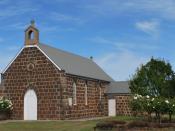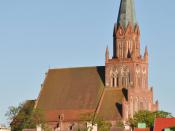Religion used to be a very important component in an American's life. Protestantism was as American as Mom and apple pie. Families would don their 'Sunday best' and go to church early on Sunday mornings. However, this situation has changed quite a bit. After reviewing the 1994 statistics I gathered from the Micase system and comparing them to the statistics received in class, I discovered a trend away from traditional religious beliefs and practices, and one toward atheism or alternative religious beliefs.
After a resurgence in the 1970's and early 1980's, the Roman Catholic church began experiencing a slow, yet steady, decline in membership. As membership in the more orthodox Roman Catholic church decreased, membership in Protestant churches increased. In recent years, the Catholic Church has become politically active and more vociferous concerning its views on moral issues such as war, abortion, and euthanasia. It is my feeling that many Catholics are searching for sects that will allow them to retain their faith in Christ without a central body (i.e.,
the Vatican) speaking on behalf of them on issues that they are capable of rationalizing for themselves.
Among Catholics and Protestants, there is a trend toward less rigid attendance of religious services. If we examine the figures from Stark and Glock's 1968 survey, 54% of Americans surveyed at the time attended church more often than once a month. This figure shrank to 40.7% in the 1994 survey. Though the Catholic church insists on weekly attendance of church, weekly attendance dropped from 52% in 1978 to 49% in 1986. Then, attendance plummeted, with only 28.3% of Catholics surveyed in 1994 claiming to have attended church in the last seven days. Even among those who remain with the traditional Christian sects, attendance is diminishing.
Christianity used to be an integral part of...


